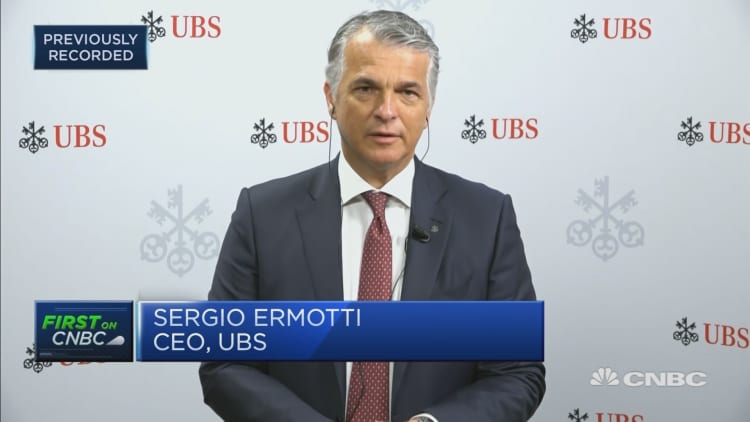
UBS reported Tuesday a 40% increase in profit for the first quarter of 2020 on the year before, helped by higher trading volumes as market participants reacted to the volatility of recent months.
Net profit attributable to shareholders came in at $1.6 billion in the three months to the end of March, up from $1.1 billion in the same quarter of 2019.
Here are some other key metrics from the results:
- Operating income came in at $7.9 billion versus $7.2 billion a year ago
- Common equity tier 1 ratio (CET1) — a metric of bank solvency — was 12.8% versus 13% a year ago
- Return on tangible equity — a metric of profitability — hit 12.8%, compared with 9.8% a year ago
"We saw a huge pick up in client engagement, despite the logistical challenges. We see that clients are more and more looking for advice," Sergio Ermotti, UBS's chief executive officer, told CNBC's Squawk Box Europe.
Turbulence in the markets helped UBS's investment bank post the biggest jump in operating profit, across the all the business divisions, on the year before. Operating profit before tax rose to $709 million from $207 million at the end of the first quarter of 2019.
Within investment banking, UBS attributed a 44% rise in revenue in its global markets division to "significantly higher volumes and volatility, particularly in Foreign Exchange, Rates and Cash Equities revenues, reflecting the impact of the COVID-19 pandemic on client activity levels."
Its global wealth management division also increased its operating profit before tax over the last year to $1.2 billion from $863 million. However, invested assets fell to $2.3 billion.
Outlook
The results come at a time of significant pressure for banks, as the coronavirus pandemic has brought the global economy to a standstill.
The Swiss bank said the coronavirus had "dramatically changed the global economic outlook," adding that it foresees disruption to many businesses and higher unemployment as a result. Given this, UBS is expecting higher levels of credit loss expenses for the financial sector.
Speaking to CNBC Tuesday, Ermotti said it was "very difficult to make predictions about any quarters going forward."
"January, February and March were all profitable months," he said, adding that the bank will seek to be "flexible" in dealing with upcoming challenges.
UBS said earlier this month that it will suspend half of its 2019 dividend payout until later this year, after pressure from Swiss regulator FINMA. The bank's chief executive officer, Sergio Ermotti, said earlier this month that it was too early to discuss 2020 dividend plans.
UBS's share price has dropped around 30% over the last 12 months. In February, the bank announced that Ralph Hamers will be taking over as chief executive officer on November 1.


